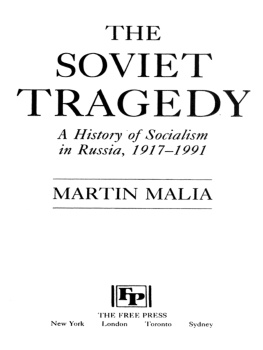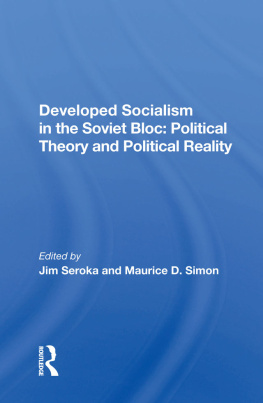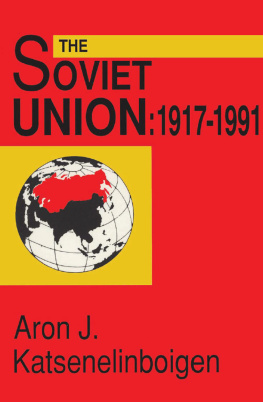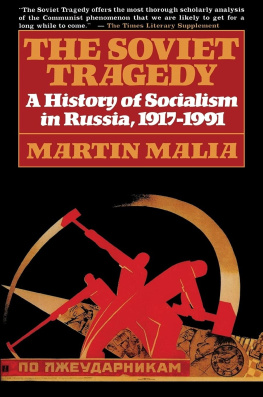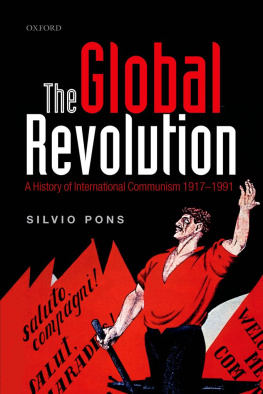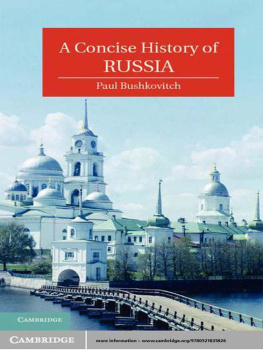THE SOVIET TRAGEDY
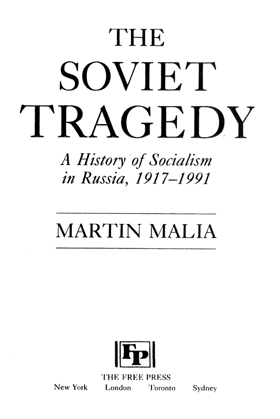
Copyright 1994 by Martin Malia
All rights reserved. No part of this book may be reproduced or transmitted in any form or by any means, electronic or mechanical, including photocopying, recording, or by any information storage and retrieval system, without permission in writing from the Publisher.
The Free Press
A Division of Simon & Schuster Inc.
1230 Avenue of the Americas
New York, N.Y. 10020
www.SimonandSchuster.com
First Free Press Paperback Edition 1996
Printed in the United States of America
printing number
5 6 7 8 9 10
Library of Congress Cataloging-in-Publication Data
Malia, Martin E. (Martin Edward)
The Soviet tragedy: a history of socialism in Russia, 1917-1991/Martin Malia.
p. cm.
Includes bibliographical references (p. ) and index.
ISBN-13: 978-0-684-82313-3
eISBN-13: 9781-4-3911-85-4-2
ISBN-10: 0-684-82313-6
1.CommunismSoviet UnionHistory. 2. Soviet UnionPolitics and government. I. Title.
HX311.5.M355 1994
321.9209470904dc20 93-50128
CIP
Pages 139 and 491: Excerpts from Burnt Norton and East Coker in Four Quartets, copyright 1943 by T. S Eliot and renewed 1971 by Esme Valerie Eliot, reprinted by permission of Harcourt Brace & Company and by Faber & Faber Ltd.
To Polands Solidarity, which began the task of dismantling Communism in 1980, and to Democratic Russia, which finished the job in 1991. The two movements worked in a liberal democratic spirit rarely realized in the painful liberation struggle of the Eastern half of Europe but on this occasion triumphant, a spirit first invoked by the Decembrists and Alexander Herzen with the watchword za nashu i vashu volnost (for our freedom and yours).
Some of the leaders of these two groups I was privileged to call friends during the course of that struggle. Indeed, this book had its inception in a request from certain of them to suggest Western Sovietological literature that might illuminate their plight and point the way out. But since most of this literature in effect sent the message that they should mute their dissidence and wait on the good graces of the system to reform itself, the only way I could meet my friends request was by subjecting Western Sovietology to the critical examination offered in these pages.
Nor has such a critique been rendered superfluous by the collapse of 1989-1991, for recent events demonstrate that the liberation of the Eastern half of Europe from the Soviet heritage is far from complete, and Western voices will continue to be heard advising retention of the viable part of that heritage. Shreds of the poisoned tunic of Nessus that Communism once was still cling, though now with a democratic socialist dye, to the emaciated bodies of the nations it enfolded for so long.
CONTENTS
PREFACE
For much of its history Communist Russia was perceived by the outside world to be, in Winston Churchills famous characterization, a riddle, wrapped in a mystery, inside an enigma. This verdict was later moderated by an American ambassador to Moscow to yield the judgment that Soviet Russia is not a mystery; it is only a secret. With the collapse of 1989-1991, the world that Lenin and Stalin built was no longer even a secret. The intimate record of seventy-four years of utopian experimentation is an open book for all to read.
Soviet history is now for the first time really history, and this closure permits us to see the pattern or logic of its life course. The present study is an effort to delineate this pattern and to probe the dynamic driving it.
What follows, therefore, is first of all a survey narrative of the evolution of Sovietism over seventy-four years as the system moved from its origins to its end. But even more, this study is an extended essay in analysis and interpretation of the Soviet phenomenon. For we did not perceive that phenomenon directly, but only as through a glass darkly. This was so in part because until almost the end Soviet reality was indeed a well-kept secret, and in part because its universalistic socialist pretensions made it an object of perturbing attraction or repulsion to the rest of the planet.
Thus, Western observers in talking about Communist Russia were almost always talking, if only indirectly, about Western problems and politics as well, a circumstance that made Soviet studies the most impassioned field of the social sciences. This passion focused on the issue of whether the Soviet Union was a unique totalitarianism, and therefore beyond democratic redemption, or instead was a variant of universal modernity, and therefore capable of true civilization. Nor did the application of the purportedly value-free categories of social science make the task of resolving this issue any easier. For the very use of such categories constituted a value judgment since they necessarily presupposed the Soviet system to be a social mechanism like any other.
The present book, therefore, is above all an effort to come to terms with the concepts and categories with which the West has attempted to decode the late Soviet enigma. In this sense, it is not only a chronicle of the Soviet tragedy, but also a commentary on much of twentieth-century intellectual history and on the contemporary worlds quest for the just society. Given the worldwide role of Soviet socialism, however, the historical autopsy of the experiment and this ideological commentary cannot be disentangled. Yet, given also that the experiment is now a closed historical episode, it should at last be possible to conduct the two inquiries with greater realism than in the past. The task of this book is to effect this conceptual transvaluation.
Introduction
THE HISTORICAL ISSUES
A Time for Judgment
Marxism has been the greatest fantasy of our century.
Leszek Kolakowski
God, how sad our Russia is!
Aleksandr Pushkin, anent Gogols Dead Souls
And along the legendary quay
Approached, not the calendar
But the real Twentieth Century.
Anna Akhmatova, anent St. Petersburg, winter 1913
The Soviet socialist revolution was the great utopian adventure of the modern age. Yet, like Janus or the two-headed Russian eagle, this experiment offered to mankind a dual face. To millions it meant the hope of socialism, and to other millions the terror of totalitarianism; but to all it posed a challenge, and no one could escape its fascination. For over seventy years, Marxs spectre of Communism in truth haunted the world. Men everywhere had to take a stand for or against the experiment in Russia and measure their domestic politics against its universalistic pretensions. The Soviet spectre thus became the great polarizing force of twentieth-century politics, giving a harsher, redder meaning to the Left and, in answer, hyperradicalizing the Right as well.
It is the positive face of the experiment that first made the affairs of the Soviet Union the affairs of all mankind. For after October 1917, Russia was not just another country: It was the worlds first workers state and historys first socialist society. The land of Lenin thus acquired universal import; for full socialismnot the half-way approximations of Western social democracyis, at least in aspiration, the acme of democratic equality. And who, in the modern age, can be against equality?
The negative face of Sovietism emerged only progressively, as the dictatorship of the proletariat turned first into the dictatorship of the Party and then into the dictatorship of Stalin, and finally as the resulting totalitarian system expanded into a global, threatening super-power. For throughout its seven decades the Soviet Union was never integrated into the international system as just another state. Thus, the negative consequences of the experiment, though they might be explained by the pressures of capitalist hostility, fascism, and war, also raised the more basicand for some agonizingquestion of whether there was a necessary link between the socialist and totalitarian guises of the Soviet Janus. Was the degeneration of Communism produced by the outside worlds hostility and Russian backwardness or by the nature of the Marxist-Leninist project itself? Did the experiment become totalitarian
Next page
